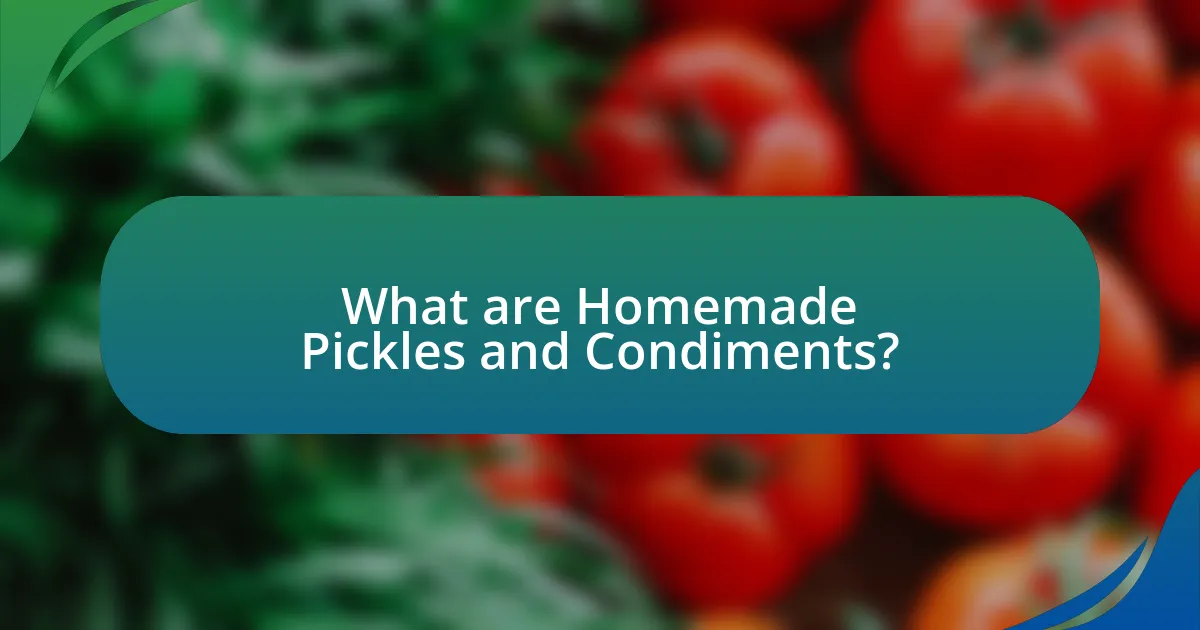Homemade pickles and condiments are food items prepared at home by preserving vegetables or fruits in a brine or vinegar solution, often enhanced with spices. This article explores the process of making these items, including essential ingredients and various preparation methods, while highlighting their popularity in pub grub for enhancing flavor and providing unique dining experiences. It discusses how homemade options elevate traditional dishes, the different types of pickles and condiments that can be incorporated into menus, and tips for successful preparation and serving. Additionally, the article addresses common mistakes to avoid and ways to ensure the freshness and quality of homemade products.

What are Homemade Pickles and Condiments?
Homemade pickles and condiments are food items prepared at home through the process of preserving vegetables or fruits in a brine or vinegar solution, often enhanced with spices and flavorings. This method not only allows for customization of flavors but also provides a fresher alternative to store-bought options. The practice of making pickles dates back thousands of years, with evidence of pickling found in ancient civilizations, highlighting its long-standing significance in food preservation and culinary traditions.
How are Homemade Pickles and Condiments made?
Homemade pickles and condiments are made by preserving vegetables or fruits in a solution of vinegar, water, salt, and spices. The process typically involves washing and cutting the produce, preparing the brine by combining vinegar and water with salt and spices, and then immersing the produce in the brine. This mixture is then sealed in jars and allowed to ferment or marinate for a specified period, which can range from a few hours to several weeks, depending on the desired flavor intensity. The acidity from the vinegar acts as a preservative, ensuring the safety and longevity of the pickles and condiments.
What ingredients are essential for making Homemade Pickles?
The essential ingredients for making homemade pickles include cucumbers, vinegar, water, salt, and spices such as dill, garlic, and mustard seeds. Cucumbers serve as the primary vegetable, while vinegar provides the necessary acidity for preservation. Water is mixed with vinegar to create the brine, and salt enhances flavor and aids in the pickling process. Spices like dill and garlic add distinctive flavors, with mustard seeds contributing a subtle heat. These ingredients are fundamental to achieving the desired taste and texture in homemade pickles.
What are the different methods for preparing Homemade Condiments?
The different methods for preparing homemade condiments include blending, fermenting, and infusing. Blending involves combining ingredients like herbs, spices, and liquids in a food processor to create smooth sauces such as pesto or mayonnaise. Fermenting, used for condiments like kimchi or sauerkraut, relies on the natural fermentation process to develop flavors and preserve the ingredients. Infusing entails steeping herbs or spices in oils or vinegars to create flavored condiments, such as garlic-infused oil or herb vinegar. Each method allows for customization and enhances the flavor profile of the final product.
Why are Homemade Pickles and Condiments popular in Pub Grub?
Homemade pickles and condiments are popular in pub grub because they enhance flavor profiles and provide a unique, artisanal touch to dishes. These homemade items often feature fresh, locally sourced ingredients, which can elevate the overall dining experience by offering distinctive tastes that mass-produced alternatives lack. Additionally, the trend towards craft food and beverages in pubs aligns with consumer preferences for authenticity and quality, making homemade options more appealing. Studies show that diners are increasingly seeking out unique and personalized food experiences, which homemade pickles and condiments effectively deliver.
How do Homemade Pickles enhance the flavor of Pub Grub?
Homemade pickles enhance the flavor of pub grub by adding a tangy, acidic contrast that balances rich and savory dishes. This acidity cuts through the heaviness of fried foods and meats, providing a refreshing palate cleanser. Additionally, the unique spices and herbs used in homemade pickles contribute complex flavors that complement the overall taste profile of pub fare. For example, dill pickles can introduce herbal notes, while spicy pickles can add heat, enriching the dining experience. The incorporation of homemade pickles not only elevates the flavor but also adds a textural crunch, making each bite more enjoyable.
What role do Condiments play in the overall dining experience?
Condiments enhance the overall dining experience by adding flavor, texture, and visual appeal to dishes. They serve as essential components that can transform a meal, allowing diners to customize their food according to personal preferences. For instance, studies show that the use of condiments can increase the enjoyment of a meal by up to 30%, as they provide contrasting flavors that complement the main ingredients. Additionally, condiments like homemade pickles can introduce unique tastes and freshness, elevating the quality of pub grub and making it more memorable.

What types of Homemade Pickles and Condiments can elevate Pub Grub?
Homemade pickles and condiments that can elevate pub grub include dill pickles, bread and butter pickles, spicy pickles, garlic pickles, and various mustards such as whole grain and Dijon. Dill pickles provide a classic tangy flavor that complements sandwiches and burgers, while bread and butter pickles add a sweet and sour contrast, enhancing dishes like pulled pork. Spicy pickles introduce heat, making them ideal for topping nachos or tacos. Garlic pickles offer a robust flavor that pairs well with charcuterie boards. Whole grain and Dijon mustards enhance the taste of sausages and pretzels, adding depth and complexity. These homemade options not only enhance flavor profiles but also allow for customization based on personal preferences, making them a valuable addition to any pub grub menu.
What are the most popular types of Homemade Pickles?
The most popular types of homemade pickles include dill pickles, bread and butter pickles, and spicy pickles. Dill pickles are characterized by their tangy flavor, achieved through the use of dill weed and garlic, making them a classic choice. Bread and butter pickles are known for their sweet and tangy taste, created by soaking cucumbers in a mixture of sugar, vinegar, and spices. Spicy pickles incorporate ingredients like red pepper flakes or jalapeños, appealing to those who enjoy heat. These varieties are widely favored due to their distinct flavors and versatility in pairing with various dishes.
How do different types of pickling affect flavor and texture?
Different types of pickling significantly affect flavor and texture by altering the ingredients’ chemical composition and moisture content. For instance, quick pickling, which uses vinegar and salt, results in a tangy flavor and a crisp texture due to the rapid acidification process. In contrast, fermentation pickling, which relies on natural bacteria, develops a complex, sour flavor and a softer texture over time as lactic acid breaks down the vegetable’s cell walls. Studies show that the fermentation process can enhance probiotic content, further influencing flavor and health benefits.
What unique pickling recipes can be used for Pub Grub?
Unique pickling recipes for Pub Grub include pickled jalapeños, pickled red onions, and pickled garlic. Pickled jalapeños add a spicy kick to nachos and burgers, while pickled red onions provide a tangy crunch that complements sandwiches and tacos. Pickled garlic can enhance the flavor of various dishes, including charcuterie boards and dips. These recipes not only elevate the taste of traditional pub fare but also offer a homemade touch that enhances the overall dining experience.
What are the essential Homemade Condiments for Pub Grub?
The essential homemade condiments for pub grub include ketchup, mustard, mayonnaise, and barbecue sauce. Ketchup, a staple in many households, is typically made from tomatoes, vinegar, sugar, and spices, providing a sweet and tangy flavor that complements fried foods. Mustard, often made from mustard seeds, vinegar, and spices, adds a sharp and zesty kick, ideal for sandwiches and sausages. Mayonnaise, created from egg yolks, oil, and vinegar or lemon juice, serves as a creamy base for many dishes and dips. Barbecue sauce, which can vary widely in ingredients, usually includes tomatoes, vinegar, and spices, enhancing grilled meats with its smoky and sweet profile. These condiments not only enhance the flavor of pub grub but also allow for customization and freshness that store-bought versions may lack.
How can Homemade Ketchup be made to complement Pub Grub?
Homemade ketchup can be made to complement pub grub by incorporating ingredients that enhance its flavor profile, such as smoked paprika, garlic powder, and a touch of vinegar for acidity. These additions create a more complex taste that pairs well with classic pub dishes like fries, burgers, and sausages. For instance, using smoked paprika adds a subtle smokiness that complements grilled meats, while garlic powder provides depth, making the ketchup more versatile for various pub grub items.
What variations of Mustard can enhance Pub Grub dishes?
Variations of mustard that can enhance pub grub dishes include whole grain mustard, Dijon mustard, and spicy brown mustard. Whole grain mustard adds texture and a robust flavor that complements meats and cheeses, while Dijon mustard offers a smooth, tangy profile that pairs well with sandwiches and dressings. Spicy brown mustard provides a kick that enhances the taste of sausages and pretzels. These mustards not only elevate the flavor of pub grub but also contribute to a more diverse and enjoyable dining experience.

How can you incorporate Homemade Pickles and Condiments into your Pub Grub menu?
Incorporating homemade pickles and condiments into your pub grub menu can enhance flavor profiles and create unique offerings. Start by using homemade pickles as toppings for burgers and sandwiches, which can add crunch and tanginess, elevating the overall taste. Additionally, craft house-made condiments like spicy mustard or garlic aioli to accompany fries and appetizers, providing customers with distinctive flavor options.
Research indicates that 70% of consumers appreciate unique condiments, which can drive repeat visits and customer satisfaction. By featuring seasonal pickles made from local vegetables, you can also promote sustainability and support local farmers, appealing to environmentally conscious patrons.
What are some creative ways to serve Homemade Pickles with Pub Grub?
Homemade pickles can be creatively served with pub grub by incorporating them into various dishes and presentations. For instance, they can be sliced and added to burgers for an extra crunch, or served as a tangy side with fried foods like fish and chips, enhancing the flavor profile. Additionally, pickles can be diced and mixed into potato salad or coleslaw, providing a zesty kick that complements the creaminess of these sides. Serving pickles on a charcuterie board alongside cured meats and cheeses also elevates the dining experience, as their acidity balances richer flavors. These methods not only highlight the versatility of homemade pickles but also enhance the overall enjoyment of pub grub.
How can Homemade Condiments be paired with specific dishes?
Homemade condiments can be paired with specific dishes to enhance flavors and elevate the dining experience. For example, homemade ketchup complements burgers and fries by adding a tangy sweetness that balances savory flavors. Similarly, a zesty homemade mustard pairs well with sausages and sandwiches, providing a sharp contrast that enhances the overall taste. Additionally, homemade mayonnaise can elevate a classic potato salad, adding creaminess and richness that ties the dish together. These pairings are effective because they leverage the unique flavor profiles of the condiments to enhance the main ingredients of the dishes.
What tips can help you successfully make and serve Homemade Pickles and Condiments?
To successfully make and serve homemade pickles and condiments, focus on using fresh, high-quality ingredients and maintaining proper hygiene throughout the process. Fresh vegetables, such as cucumbers or peppers, should be sourced locally when possible, as they enhance flavor and texture. Proper sterilization of jars and utensils is crucial to prevent contamination and spoilage, ensuring the safety and longevity of the products.
Additionally, experimenting with various spices and flavorings, such as dill, garlic, or mustard seeds, can elevate the taste profile of your pickles and condiments. Following established recipes and guidelines for brine ratios—typically a mix of vinegar, water, and salt—ensures the right balance of acidity and flavor.
Serving homemade pickles and condiments in attractive, labeled jars can enhance presentation and provide information about the ingredients, which is appealing to guests. This approach not only showcases the effort put into making the items but also encourages appreciation for homemade food.
What common mistakes should be avoided when making Homemade Pickles?
Common mistakes to avoid when making homemade pickles include not using the right vinegar, failing to sterilize jars properly, and neglecting to measure ingredients accurately. Using the wrong type of vinegar can affect the flavor and preservation of the pickles; for example, white vinegar is typically recommended for its acidity. Proper sterilization of jars is crucial to prevent contamination, as unsterilized jars can lead to spoilage. Additionally, precise measurements of salt and sugar are essential, as incorrect ratios can result in overly salty or sweet pickles, compromising the intended taste.
How can you ensure the freshness and quality of your Homemade Condiments?
To ensure the freshness and quality of your homemade condiments, use fresh, high-quality ingredients and store them properly. Fresh ingredients, such as ripe vegetables and herbs, contribute to better flavor and nutritional value. Additionally, using sterilized jars and airtight containers prevents contamination and extends shelf life. For example, homemade sauces should be refrigerated and consumed within a few weeks, while pickles can last longer if properly canned. Regularly check for signs of spoilage, such as off smells or mold, to maintain quality.




